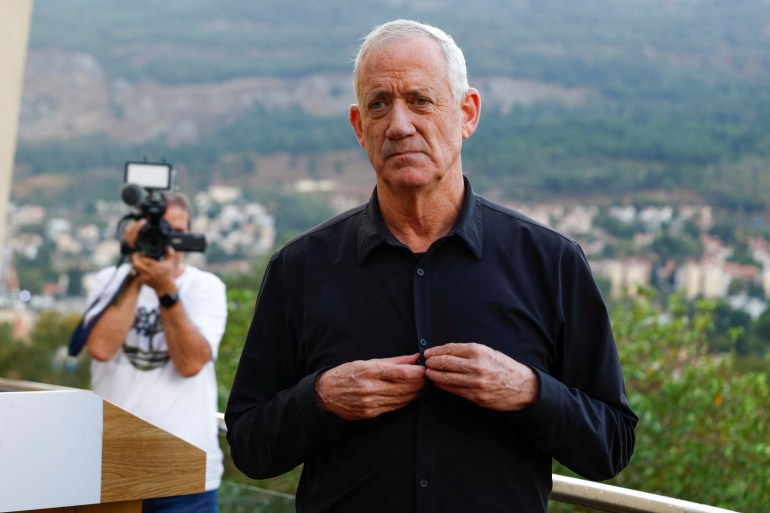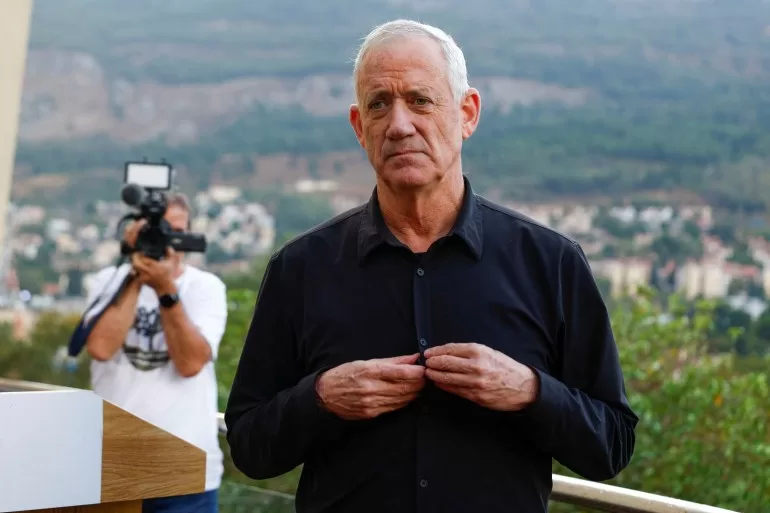Benny Gantz, the Israeli prime minister’s principal rival, has quit the government. What now?
Former general and leader of Israel’s National Unity party Benny Gantz has resigned from the war cabinet, citing the failure of the wider cabinet to agree a plan for Gaza beyond the current war.
In mid-May, Gantz submitted a six-point plan for the administration of Gaza beyond the fighting. At the time, he said that if this was not agreed to, he would quit the cabinet.
Gantz is regarded as a relative centrist and the principal rival to Prime Minister Benyamin Netanyahu. Here are the details of what happened and what this may mean for Israel and Palestine:
What was Gantz’s plan?
Gantz said his proposed six-point plan would include bringing a temporary US-European-Arab-Palestinian system of civil administration for the enclave, with Israel retaining overall control of security.
It also proposed spreading the burden of national service across Israelis by including ultra-Orthodox Jews, whose exemption from the draft is protected by two parties in Netanyahu’s coalition cabinet.

Why didn’t Netanyahu like Gantz’s plan?
There is growing consensus from Israel and abroad that Netanyahu rejected it for personal gain.
In his resignation, Gantz said: “Netanyahu is preventing us from advancing toward true victory.”
Israel’s principal ally, US President Joe Biden, told Time Magazine on Tuesday that “there is every reason for people” to think Netanyahu is prolonging the war on Gaza for his own political survival.
That may be the belief that the war will protect Netanyahu from legal repercussions of the bribery, fraud, and breach of trust charges that have hung over him since his 2019 indictment.
It may also be that any future plan for Gaza may split his coalition cabinet – some of whom want to build illegal settlements there and others who, like Gantz, want it administered by an international task force.
Netanyahu – who campaigned as “Mr Security” – may also be trying to avoid dealing with the failings of October 7 when Palestinian group Hamas led an attack on Israel that saw 1,139 people killed and dozens taken captive.
How does this benefit the far right?
Gives them more room to grow.
Gantz leaving the war cabinet, which was him, Netanyahu and Defense Minister Yoav Gallant, leaves a slot open for one of the far-right politicians Netanyahu relies on to sustain his rule.
National Security Minister Itamar Ben-Gvir has already expressed interest in Gantz’s war cabinet seat.
The extreme right-wing partnership of Ben-Gvir and Finance Minister Bezalel Smotrich is strong.
Both are in Netanyahu’s coalition cabinet and their combined parliament seats outweigh Gantz’s centre.
While Gantz was an ineffective political counterweight, his departure from government will remove a strong voice critical of the far right from Israeli politics.
What does this mean for Gaza?
Little that’s good.
Ben-Gvir and Smotrich are clear that their plan for Gaza involves its people “voluntarily migrating” and Israelis settling it.
Netanyahu may oppose this but has yet to confront the far right on anything significant since war was launched on Gaza in October.
Will this change how Israelis feel?
Israelis still seem to support the war, if starkly divided along political lines, but fewer are confident that Netanyahu will achieve his aims of “destroying Hamas” and freeing the captives through military means.
Every week, tens of thousands of people crowd into the so-called Democracy Square in Tel Aviv and other locations around the country to demand an exchange deal to release the captives and the dismissal of Prime Minister Netanyahu.
Polling shows Gantz consistently in the lead over Netanyahu in polls, with Netanyahu only edging ahead when Gantz threatened to quit the cabinet, which was deemed unpatriotic.
But elections may still be some way off, according to Eyal Lurie-Pardes of the Middle East Institute.
He feels that if Netanyahu can hold his coalition together until the summer recess, electoral laws would mean an election could not happen until March.
Will it change how Israel’s allies feel?
There is little to suggest that Gantz’s resignation, despite being the preferred interlocutor for the United States, will change anything.
The US and Western states have continued to supply Israel with arms and diplomatic support since it started bombing Gaza in October – ignoring international accusations of “genocide” and applications for international arrest warrants for Netanyahu and Gallant.
Even the apparent rejection of a ceasefire plan presented by Biden has done little to undermine support for Israel from the US.
